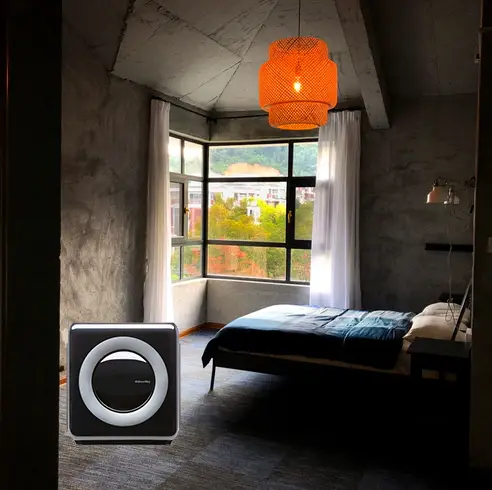Introduction
True to their name, air purifiers have been used in households where there’s a lot of pollution. But if you’re new to them, you may be skeptical of buying one, since some units can be a bit more expensive than others. In line with this, you may be curious about the benefits of air purifiers in the bedroom.
Not to worry – in this article, we round up some of the frequently asked questions about air purifiers to help give you some insights with its benefits and what to expect from them. We’ll also give you some pointers about how they work and which features to look for.

Do air purifiers help you sleep better?
Yes, air purifiers can significantly help you to sleep better in your bedroom. This is because of the following features:
- Whisper-quiet motors. Unlike noisy fans, air purifier tends to have a quieter motor, which can help you to sleep properly. Most of them even have sleep modes in which the motor speed runs very slowly but without sacrificing the quality of its air filtering.
- Cleans the air from pollutants. HEPA filters are at work with an air purifier. By cleaning the air from pollutants with these filters, you can rest well without much worry, especially for allergy suffers. Learn more with our article about air purifiers for asthma and allergies.
- Low-light levels. Most of these units have a low light design so that they don’t distract you when you sleep. Look for brands and models that have this feature, especially if you can’t sleep at night even with a little blinding light at night.
- Automatic mode. Most of these air purifiers have a mode that automatically detects the air so that you don’t have to tone it down manually, so you can get a better night’s sleep. It also shuts down on its own if you set its timer.
Do air purifiers make the room cold?
Not exactly. Air purifiers are only made to help move the air due to its fan, but you still need a cooler such as an air conditioning unit to keep the room cool (or  use any natural method).
use any natural method).
However, if you have an air purifier, the air conditioning unit may have a lesser workload in the long run due to the air purifier’s fan that moves air throughout the room. This effect can add to a cooling sensation that you may feel.
What is an air purifier good for?
Air purifiers are good for the following:

- Cleaning air from pollutants. HEPA Filters, especially true HEPA filters, are the mechanisms by which air purifiers clean the air by trapping up to 99.97% of allergens. This includes dust, pollen, pet dander, and the like. HEPA filters are wonders, which is why we’ve also taken the liberty to show you our article about choosing the best HEPA air purifier to buy.
- They remove bad odors. Ever cooked fish and didn’t like the smell? Do you always have frequent smokers in the house or as guests? Does your pet emit a certain bad odor that most of your family members do not like? An air purifier usually has carbon filters as well, other than their HEPA filters, which can lessen these odors. The carbon odors are usually attached to your filter system.
- They can help in hospitals. If you ever own a clinic or want a hospital to stay clean, an air purifier is the best way to do it. The air purifier can help combat airborne diseases by filtering the air. This is why we’ve also written an article on best hospital grade whole-house air purifiers out there.
- Lessens allergy and asthma instances. If you ever suffer from asthma (as we mentioned above) or allergies, you’d probably want to have an air purifier. The reason for this is that they filter out most of the allergens in the air, especially when it’s pollen season or you can’t breathe properly due to the pollution around your home.
- Homes with pets and gardens. If you own a garden, chances are you’ll probably have hay fever (or someone you know will have) during pollen season, which is in spring. Or, if you have pets at home, their dander could fly anywhere around the house, possibly causing allergies as well. To help clean the air, you may want to look for an air purifier to take care of such messes.
- Restaurants and food establishments. Those who are keeping a business that involves cooking food may also benefit from an air purifier. This is because the smoke can really put off some guests, so it may be ideal to help clean the air much like how hospitals sanitize with an air purifier to help your guests and employees breathe better.
Do air purifiers make the air dry?
No, it doesn’t. Air purifiers are not to be confused with dehumidifiers, which change the air humidity, making it dry. Unlike dehumidifiers and humidifiers, air purifiers only focus on taking out the pollutants in the air and they don’t really mind about the air humidity.
Therefore, air purifiers are definitely okay regardless of whether you live in cold, dry climates, or whether you live in tropical, humid ones.
Most people often mistake humidifiers/dehumidifiers with air purifiers due to the unit designs that are almost similar. The next time someone gets confused, give them this answer!
Does an air purifier help cool a room?
No, but only to some extent. Without an air conditioning unit, as we mentioned above, air purifiers cannot cool a room. However, they can help your AC unit in the moving room and circulating it, since most air purifiers are equipped with a fan. Such a fan can move air so that it lessens your AC unit’s load.
Conclusion
To wrap it up, air purifiers help with pollution problems, bad smells, and they can also automatically detect the air quality indoors so you don’t have to check on them all the time. If you’re convinced with all the pros of having an air purifier in your room, you may now want to check out which air purifier is the best out there in the market.



